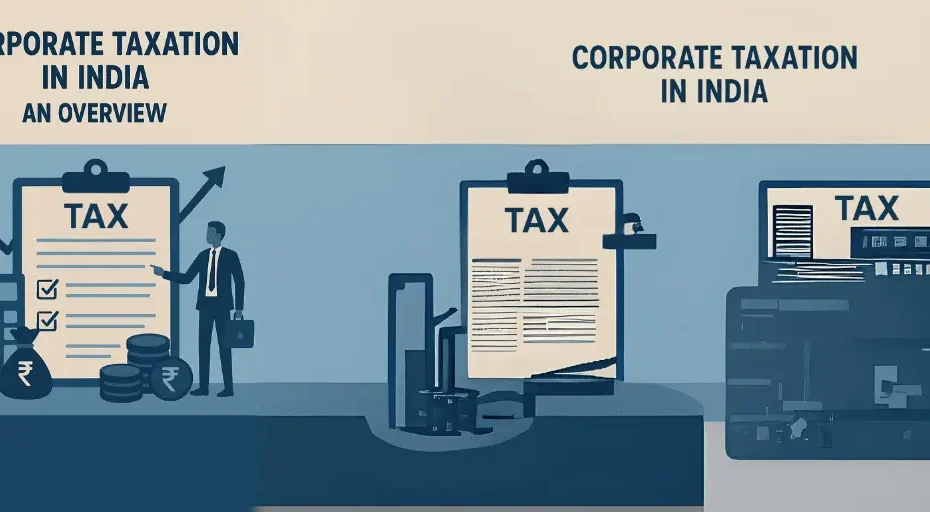Corporate Taxation in India: An Overview
Corporate taxation is a crucial component of India’s economic framework, influencing business operations, investment decisions, and overall economic growth. Corporate tax India is imposed on the income of domestic and foreign companies operating in the country. Understanding its structure, rates, and compliance requirements is essential for businesses to ensure regulatory adherence and optimize their tax liabilities.
Understanding Corporate Tax in India
Corporate tax India refers to the direct tax levied by the government on the profits of companies. It is applicable to all domestic and foreign companies engaged in business activities within India. The taxation system is governed by the Income Tax Act, 1961, which outlines the rules, exemptions, deductions, and penalties associated with corporate taxation.
Types of Companies Liable for Corporate Tax in India
Domestic Companies: Companies incorporated in India are considered domestic entities. These firms are taxed on their global income, regardless of whether the income is earned in India or abroad.
Foreign Companies: Companies that are incorporated outside India but have operations, branches, or business activities within the country fall under this category. They are taxed on the income derived from business activities conducted in India.
Corporate Tax Rates in India
Corporate tax India is structured based on the type and annual turnover of a company. The government has introduced various tax incentives to promote investment and economic growth. Below are the prevailing corporate tax rates:
Domestic Companies:
Companies with an annual turnover up to INR 400 crores: 25%
Companies with a turnover exceeding INR 400 crores: 30%
Foreign Companies: 40%
Minimum Alternate Tax (MAT): 15% of book profits (applicable to companies that do not fall under regular tax computation due to exemptions or deductions)
Additionally, a surcharge and health & education cess apply, depending on the income slab.
Recent Reforms in Corporate Taxation
The Indian government has undertaken several reforms to make corporate tax India more competitive. Some of the significant reforms include:
Reduction in Corporate Tax Rates: In 2019, the government introduced an optional reduced tax rate of 22% for domestic companies not availing exemptions.
New Manufacturing Companies Incentive: A special corporate tax rate of 15% was introduced for newly established manufacturing companies.
Phasing Out of Tax Exemptions: The government is gradually eliminating various tax exemptions and deductions to simplify compliance and enhance transparency.
Digital Taxation: The introduction of Equalization Levy ensures that foreign digital businesses earning revenues from India also contribute to corporate tax India.
Corporate Tax Compliance and Filing
To ensure smooth tax compliance, companies need to adhere to filing deadlines and documentation requirements. Key aspects include:
Filing of Income Tax Returns (ITR): Companies must file annual returns by 30th September of the assessment year.
Tax Deducted at Source (TDS) Compliance: Proper deduction and deposition of TDS on various payments are mandatory.
Transfer Pricing Regulations: International transactions with related parties must comply with transfer pricing norms.
Advance Tax Payment: Companies must pay advance tax in four installments throughout the financial year.
Non-compliance with corporate tax India regulations can result in hefty penalties, interest charges, and legal consequences.
Deductions and Exemptions under Corporate Tax in India
To encourage business growth, the Indian taxation system offers several deductions and exemptions. Some notable ones include:
Depreciation Benefits: Companies can claim depreciation on fixed assets to reduce taxable income.
Research & Development (R&D) Expenditure: Certain R&D expenses qualify for tax deductions.
Start-up Tax Benefits: Eligible start-ups enjoy tax holidays for up to three years.
Section 80JJAA Deductions: Businesses creating new employment opportunities receive additional deductions.
Impact of Corporate Tax on Business and Economy
Corporate tax India plays a pivotal role in shaping investment decisions, profitability, and economic development. A competitive tax regime attracts foreign direct investment (FDI), fosters entrepreneurship, and ensures adequate revenue generation for public welfare. However, high tax rates and complex compliance requirements can pose challenges for businesses.
To strike a balance, the government continually revises tax policies, offering incentives while maintaining fiscal discipline. The recent reduction in corporate tax rates has positioned India as an attractive destination for global investors.
Future of Corporate Taxation in India
Looking ahead, corporate tax India is expected to undergo further reforms to enhance ease of doing business. Key focus areas may include:
Simplification of Tax Laws: Streamlining regulations to reduce compliance burden.
Digital Taxation Framework: Addressing taxation challenges posed by digital and e-commerce businesses.
Global Minimum Tax Implementation: Aligning with international taxation norms to prevent tax base erosion.
Conclusion
Corporate taxation is a significant aspect of India’s financial landscape. With continuous reforms and tax incentives, corporate tax India aims to create a business-friendly environment while ensuring government revenue sustainability. Businesses must stay updated on tax regulations, comply with filing requirements, and optimize tax planning strategies to thrive in the competitive market.
By understanding corporate tax India in detail, businesses can effectively manage their tax obligations and contribute to India’s economic progress.
Our GST Services

All E-commerce Tax services
E-commerce tax services help online sellers navigate GST registration, compliance, return filing, TCS management, tax planning, and audits, ensuring efficient tax management and legal compliance.

GST Filing
GST filing is the process of submitting tax returns to the government, detailing sales, purchases, and taxes paid or collected, ensuring compliance with GST laws.

GST Registration
GST registration is the process where businesses obtain a GSTIN from the government, allowing them to collect taxes, claim input tax credits, and comply with GST laws.





